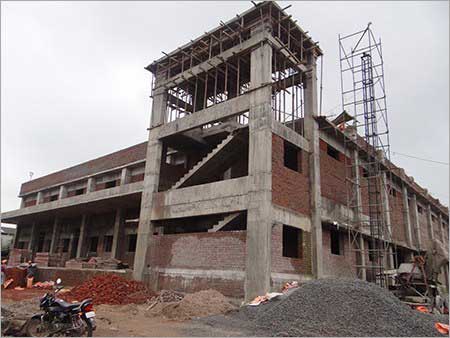Table of Contents
Introduction
The ultimate bearing power or ultimate bearing capacity of a soil is the minimum load per unit area, which causes failure to the soil. It is known that a load of any structure is finally transmitted to the soil lying below the foundation of the structure. Hence it is very essential to know the strength and behaviour of the underlying soil. Bearing capacity of the soil is its ability to support the load coming over it per unit area without causing excessive settlement and displacement.
But sometimes on testing the soil, its bearing capacity is found to be inadequate for shallow depths. Therefore, it is necessary to take some measures so that the bearing capacity of the soil is increased.
How to Increase Bearing Capacity
Improvement in the bearing capacity of the soil can be brought about by using the following measures-
Compacting the soil
In this method, the width of the foundation trench is increased by about 300 mm or so and then a layer of rubble is spread in a thickness of about 300 mm to 400 mm over the bottom of the foundation and rammed. If rubble gets completely buried into the soil, another layer of rubble about 150 mm to 250 mm is spread and rammed. The foundations treated in this way show considerable improvement in their bearing capacity. For design purpose, this increased bearing capacity may be adopted.
Increasing depth of the foundation
Bearing capacity of the soil gets increased by increasing the depth of the foundation. But this measure can only be adopted at sites where the sub-soil water table is very much below the foundation.
Drainage of soil
Bearing capacity of the soil can be improved by providing effective drainage from the vicinity of the foundation. We know that the presence of water decreases the bearing capacity of the soil and hence every effort should be made to keep excess water away from the foundation.
For drainage purpose, Open jointed tile drains may be laid just below the foundation trenches.
If some spring is met or water finds its way through the vein of rock, pipes should be provided to drain off this water.
Sheet piling
The displacement of soil under the action of load can be prevented by confining the ground by sheet piles. This method has been in use with success in shallow foundations in sandy soils.
Grouting
In this case, a number of bore-holes are driven into the ground and cement grout forced through them. The cracks or fissures of the rocks are thus filled with cement grout and bearing capacity of the soil gets improved.
Driving Sand Piles
In this method, holes are driven in the soft soil of foundation with the help of wooden pile or by any other method, and sand is then filled in them and rammed. These are called sand piles. Bearing capacity of the soil can be considerably increased by providing sand piles at close intervals.
Chemical Treatment
In this method, certain chemicals are used in place of cement grout to solidify the soil. As this process is very costly, it is feasible only in case of important structures.
I hope this article will help you. You may also want to see my other post from my Blog. If I have missed anything here, please let me know about that in the comment below this post.
Share it with your friends.
Happy Learning.
If you liked this article, then please help me to share this article with your friends through Facebook, Twitter, WhatsApp or Instagram. You can also find us on Facebook, Twitter, Instagram, Telegram Channel, YouTube Channel and Pinterest. Also, Subscribe to our mailing list to get new post update from us. And, do me a favour, if you find this post helpful, rate a 5 star below-






